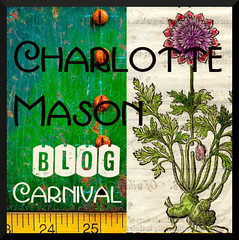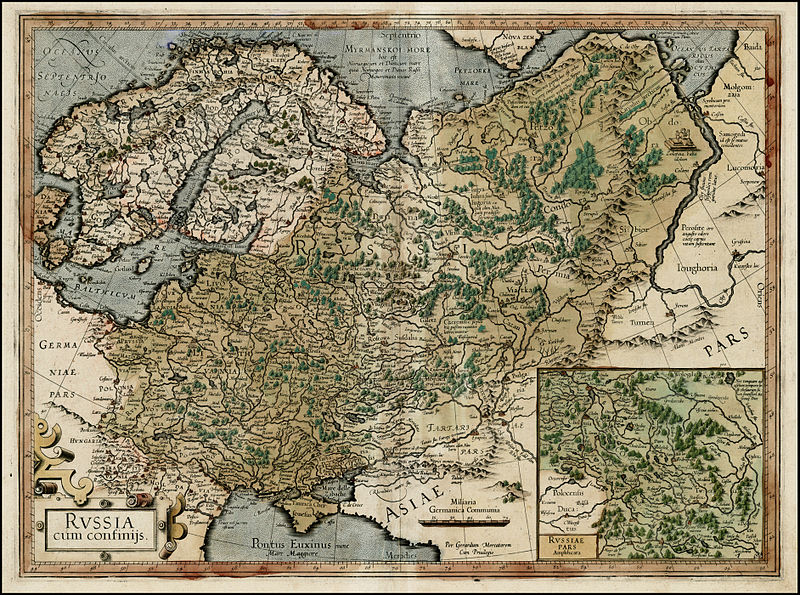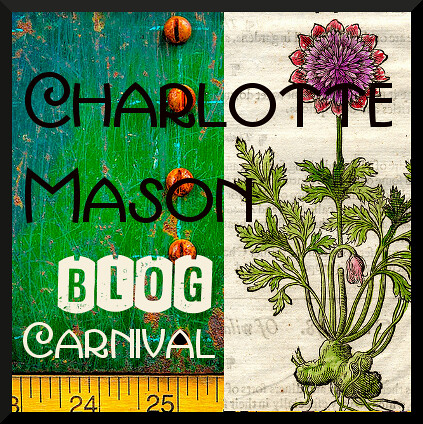“Let the boy read and he knows, that is, if he must tell again what he has read.”
Charlotte Mason, vol 6 pg 262
If it is true that, as one writer put it – we narrate and then we know – our children's comprehension of the material then, not to mention their retention of it, depends on narration. It would seem that it's of utmost importance and that we had better get it right, hadn't we?

I love this picture as an illustration for this subject.
It reminds me of how we are always there to help if need be.
Yet we allow the child to have the full experience in education;
to come face to face with his own reality, his circumstances, himself.
"The message for our age is, Believe in mind, and let education go straight as a bolt to the mind of the pupil."
Charlotte Mason, vol 6 pg 261
As parents/teachers, just what do we have to do with narration?
"This, of getting ideas out of them, is by no means all we must do with books. 'In all labour there is profit,' at any rate in some labour; and the labour of thought is what his book must induce in the child. He must generalise, classify, infer, judge, visualise, discriminate, labour in one way or another, with that capable mind of his, until the substance of his book is assimilated or rejected, according as he shall determine; for the determination rests with him and not with his teacher."
Charlotte Mason, vol 3 pg 180
"We as teachers offend deeply in this matter. We think that we shall be heard for our much speaking and we repeat and enforce, explain and illustrate, not altogether because we love the sound of our own voices, but because we depreciate knowledge, we depreciate children, and we do not understand that the mind and knowledge are as the two members of a ball and socket joint, each of them irrelevant without the other."
Charlotte Mason, vol 6 pg 258
So, the getting of ideas and the putting of them into order belongs to the child. And according to the quote above, it seems there are ways we can hinder our children.
Circumstances and books vary. Some may be starting out with very young children. Others may be coming to a Mason education midway through. Still others will be adapting to special needs in their families. Many times troubles arise, and suddenly, we think we need to take things into our own hands. In order for them to get everything (something?) out of the reading, I've got to ask them QUESTIONS. Especially, leading or probing questions to prompt their memory. Right?!
No way! Listen to what CM says,
"Given a book of literary quality suitable to their age and children will know how to deal with it without elucidation. Of course they will not be able to answer questions because questions are an impertinence which we all resent, but they will tell you the whole thing with little touches of individual personality in the narrative."
Charlotte Mason, vol 6 pg 261
"When a child is reading, he should not be teased with questions as to the meaning of what he has read, the signification of this word or that; what is annoying to older people is equally annoying to children... Direct questions on the subject-matter of what a child has read are always a mistake. Let him narrate what he has read, or some part of it. He enjoys this sort of consecutive reproduction, but abominates every question in the nature of a riddle. If there must be riddles, let it be his to ask and the teacher's to direct him the answer. Questions that lead to a side issue or to a personal view are allowable because these interest children––'What would you have done in his place?'"
Charlotte Mason, vol 1 pg 229
The only really helpful questions then, are those based on the Socratic method which tempt the listener to apply a moral or lesson to their own life.
If lotsa questions don't help, by golly, what else can we do?
Primarily, we help by giving patience, time and practice in narrations. After that, more patience, more time and more practice. And then? Still more patience, time and practice. :) You get the picture. But, Charlotte also recommends several other ways that the teacher can help without getting in the way of the reader and his mind feast. Two of these come in the way of preparation before the work of narration is done.
"The Teacher's Part.––The teacher's part is, in the firstplace, to see what is to be done, to look over the of the day in advance and see what mental discipline, as well as what vital knowledge, this and that lesson afford; and then to set such questions [see acceptable types of questions above] and such tasks as shall give full scope to his pupils' mental activity."
Charlotte Mason, vol 3 pg 181
Pre-reading Prep:
Giving an introduction to a reading is sometimes helpful if not downright necessary. Remember, that as educators, we want to stay out of the way as much as possible. The purpose of an intro would be to aid the student's understanding, in a way so as not to interrupt the reading. It is NOT a supplement to the story. It is not a teacher dictated lesson. It is only soil preparation, as it were, so that the child may listen unencumbered by things too difficult. A helpful introduction might include, explaining difficult vocabulary, noting important names and highlighting any mapwork pertinent to the reading. Books that might benefit from a quick overview include, history titles, science reads, and a few more specifically: Parables of Nature, Our Island Story, Pilgrim's Progress and Marco Polo. But as is often the case, after recalling what happened in the last chapter, an intro won't even be necessary.
"Do always prepare the passage carefully beforehand, thus making sure that all the explanations and use of background material precede the reading and narration. The teacher should never have to stop in the middle of a paragraph to explain the meaning of a word. Make sure, before you start, that the meanings are known, and write all difficult proper names on the blackboard, leaving them there throughout the lesson. Similarly any map work which may be needed should be done before the reading starts."
Next, a simple reminder before the reading begins, that the student will be narrating when the reading is over, would not be out of place. Just quickly say, "Listen and let the words paint pictures in your imaginations. When I stop, I'm going to ask someone to tell back the story. If it is your turn to tell, you might even choose to use some of the same words from the story! Everyone should be paying close attention."
Pre-narration Prep:
Don't forget! The goal of the following tips is simply to help the teacher stay out of the way as much as possible.
1. Keeping those names of important people and places in the story written and within eyeshot can be SUPER helpful (use the same list of words/names you used as an intro to the reading). Being able to refer back to these, should help the narrative flow. This is very practical with those books you are reading aloud, but even in those early years if your child is reading some of the more difficult books alone, he/she will still benefit from an occasional intro and/or having difficult vocab and/or names written out ahead of time.
2. It also helps to have a few moments (even a half hour or so) to seriously reflect before giving a narration. Sometimes, when put directly on the spot, a student won't do well. He/she can't think of anything or perhaps their thoughts are still a little muddled and they feel frustrated having to put words to them. Maybe they've gotten hung up on an idea planted by something they heard in the story that they need time to process before having to move on to the work of narration. Giving them just a few minutes to order their thoughts with a few of the following prompts can work wonders.
Sometimes, when the reading was difficult, or we've been a bit distracted, I give my younger kids some extra prompts, "Take a minute to remember back to where we started reading. [pause] Can you remember what happened first? [pause] okay, got it? After you've thought for a minute, start as soon as you're ready." This seems to help them to put it in sequence.
3. And finally, for older children, knowing that they can jot down notes, or make lists or marks in the margins of their books, may help them to better formulate their narrations, and avoid a second reading. The students might write down their own questions that cover the reading, or enumerate a series of points made, or any other variety of activities that will help them to own the material for themselves.
“Let marginal notes be freely made, as neatly and beautifully as may be, for books should be handled with reverence. Let numbers, letters, underlining be used to help the eye and to save the needless fag of writing abstracts. Let the pupil write for himself half a dozen questions which cover the passage studied; he need not write the answers if he be taught that the mind can know nothing but what it can produce in the form of an answer to a question put by the mind to itself."
But let this be a warning to us all...
"Disciplinary Devices must not come between Children and the Soul of the Book.––These few hints by no means cover the disciplinary uses of a good school-book; but let us be careful that our disciplinary devices, and our mechanical devices to secure and tabulate the substance of knowledge, do not come between the children and that which is the soul of the book, the living thought it contains.”
Charlotte Mason, vol 3 pg 181
Join me again next time in thinking how we might approach correcting narrations.
Posts in this series:
And then, like, well... and other narration woes. {pt.1}
Narration: A little prep goes a long way {pt.2} <- -="-" are="are" b="b" here="here" you="you">
Narration: Correcting sloppy speech {pt.3}

























































